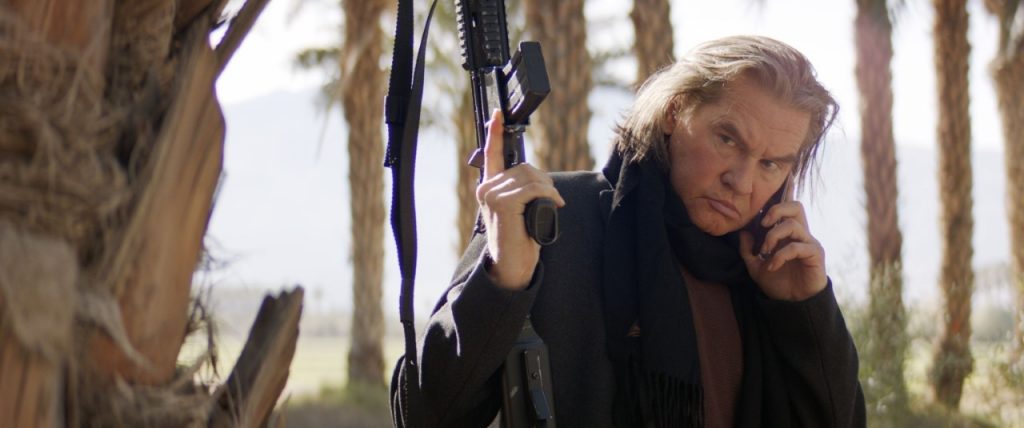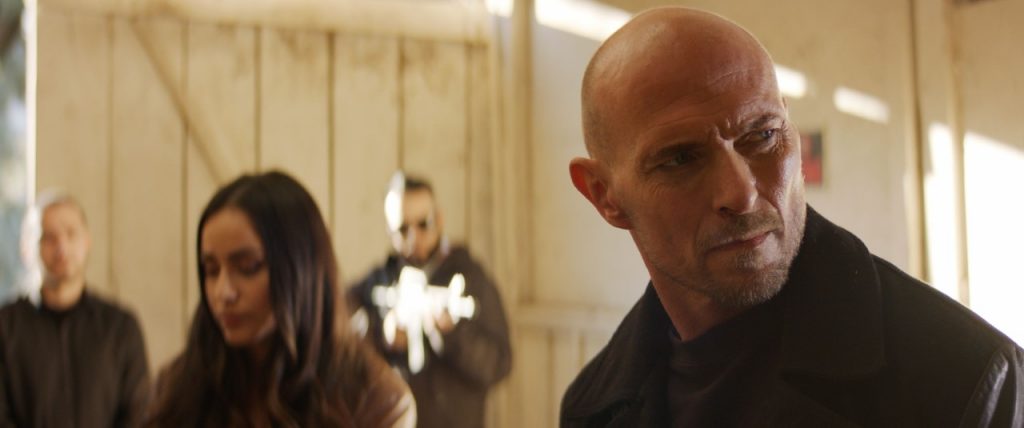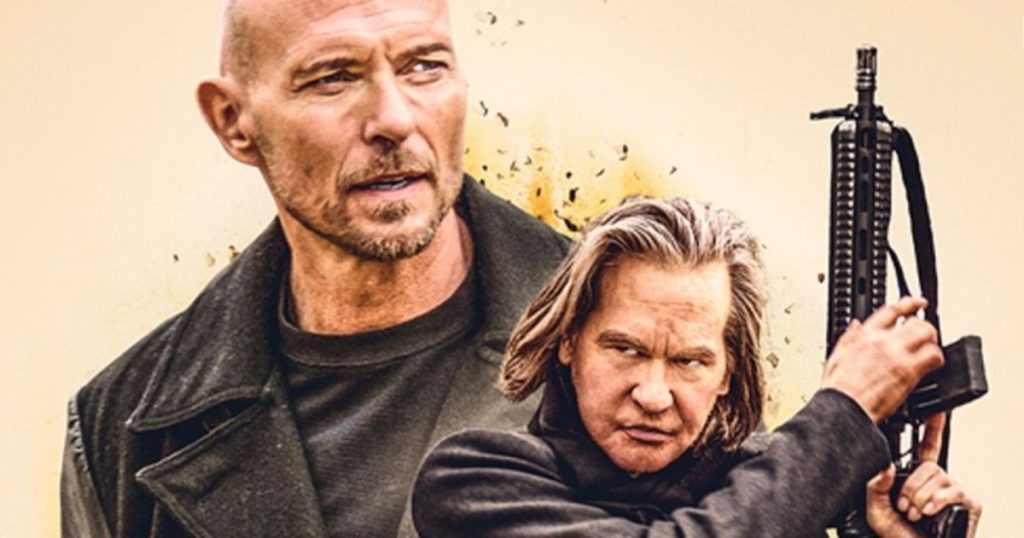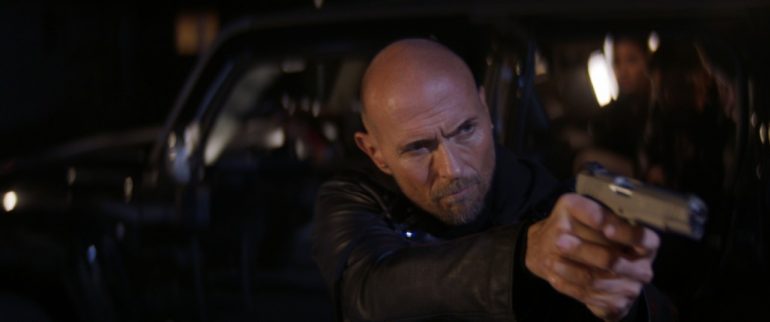Luke Goss is a busy man. He walked away from a successful British pop music career to pursue stage acting in the late 90s. By 2002, he had already gotten his first big break in film as he landed the lead role of “Jared Nomak”, the alpha reaper vampire, opposite Wesley Snipes in director Guillermo Del Toro’s horror/action hybrid BLADE II. Del Toro would then again cast Goss as the foil for a comic book-based hero in 2008. This time, it was the villainous elven “Prince Nuada” squaring off with Ron Perlman in HELLBOY II: THE GOLDEN ARMY.
He has taken that notoriety from those roles and turned it into a film career that now spans more than 70 films in 20 years.
His latest is the crime film PAYDIRT. Here he plays “Damien Brooks”, a recently paroled criminal who teams up with his former crew to find 30 million dollars that was stolen, years earlier, during a failed DEA bust that was then lost in the California desert. Things are made more difficult for Damien when it becomes obvious that the policeman who put him away originally, played by the legendary Val Kilmer, is looking to catch him breaking parole so he can send him right back to jail.
I recently had the chance to sit down with Luke Goss to talk about acting, art, and the importance of a good meal with friends…
How did you become involved with PAYDIRT?
Well, [the director] Christian [Sesma] is a buddy and we both had a window of time. I was heading off to do a movie in about a month or so, and he said, “Hey, do you want to have a meeting for lunch and just talk about it? Come on board as a producer and I’ll present something to you.” And I read it. We had a great meeting. We said, look, with Mikey Hatton as a producer, Christian directing, myself coming on board as a producer, as well, and owner of the show. So, we put all the money on screen entirely and make a movie. And I was like, “Yeah, I love it. I like this character. I think there’s an opportunity.” My ideal is like the Clint Eastwood and Steve McQueen approach where there’s a very minimalistic leadership. There’s no one wagging a finger here. I saw that here in the story. I don’t know. It felt fun too.
The Steve McQueen-vibe definitely comes through.
Oh, cool, man. I just, you know what it is? I think sometimes there comes a point when you know, this character I play has known these people for a lot of years, they all have a lot of love, it’s unspoken. We all do have love for each other. You know, Mikey’s a great guy. Pauly [Sloan] (THE SCORPION KING), I’ve done a bunch of movies with him. He’s a wonderful guy. Christian’s growing ever as a director. He’s been a friend of mine for years, over a decade. So, and we’re all growing in that regard and we’ve known each other longer than ever. As you know, most of us in film don’t have reams of people to rely on. It’s a very transitory kind of industry, but I have to be honest with you that lot is a bunch of lovely guys to work with. So, we all came together as creators and executives and said, “Hey, let’s go make a movie.” And Val is obviously gloriously involved, bringing his love and his light and his victory to his recent battle as well.

That actually leads me to my next question. What was it like working with Val Kilmer here? This is his first major role since all the health issues he’s been through in recent years.
Exactly. And you know what? I think the humanity that’s coming through in this pause in history right now. We were allowing our feminine energy, our creative energy, our compassionate energy to rise. And then here’s Val bringing in yet again, another great performance of a broken man, post his struggle and his victory over them. As they say, God works in mysterious ways, but it’s like he brings light and love from the first time I’d seen him. This is the third time I’d worked with him. His arms were open, mine too. We must’ve hugged for 30 seconds. He just, he brings fun. He’s a walking example of dignity and strength. And I just think as an actor, he’s an American treasure. I really do.
I completely agree. He still has that presence even after all he’s been through.
Hell yeah, you watched it. [laughs] The way he turns that gun at the end, it sounds silly, but he so understands why he’s doing what he’s doing and making perfect choices, you know?
I do. Speaking of making choices in acting, how do you prep for the roles you take? What is your process?
Oh, I love talking about this, especially because you can’t really bore your friends with this stuff. [laughs] But it’s primarily a cerebral event for me. It used to be when I first did it, I had pen and paper scribbles, scribbles, scribbles. My scribbles go all over the page now, like, ‘cause I want to reference them on the day. If it’s something that’s truthful and I’ve the responsibility to shoot five, six, seven scenes a day. I’m like, “Look, okay. Right? That’s it there in my notes. These notes are good guidances to me. So, I don’t forget this premise. I don’t overlook this or that because it might be important subtext. But I do not want to forget.
So I’ll make a scribble, but I’ll be wandering around. I’ll have a coffee, or I’ll get a juice or I have some food, in and out. I’ll cook or I’ll be in the studio in my house or painting. And I’ll find myself constructing the individual. Who’s the father, mother, backstories, everything. The more you familiarize yourself with the details of that backstory in a sense of like wallpaper on the structure. So, when you get on set, you just feel like that individual because then you don’t have to hold back constructing it anymore. And what happens is during the walk of filming a character that world gets exponentially bigger quickly because you start living it with more passion and it then makes your choices a lot easier. That’s how I do it.
You had the chance to direct a film in 2017, YOUR MOVE. Did that experience change how you work as an actor at all?
Not really. I think it did give me an insight to the director’s efforts, but I’ve always seen that with people like Guillermo Del Toro, even Christian would come over to give notes. He’s very respectful, he loves and respects his actors’ contribution. That’s the same with Del Toro, except Del Toro’s very sure. And if he does ask or bring up debate, it’s because he respects and cares about you. I’ve seen it in action.
But for me, directing is something I want to do a lot. I love directing, but I just want to direct movies that can be driven by their importance to their composition and beauty. I won a little festival in the UK, which was nice for a first outing. So, you know, I will do it again. I’ve got two scripts I’d love to do. We’ll see if that happens.

Speaking of the people you have worked with, who are some of your influences as an actor and as a filmmaker?
That’s a wonderful question. I think McQueen and Eastwood at the beginning. I think Morgan Freeman, Michael Caine. There’s so many great people, Meryl Streep, Jodie Foster, Tim Robbins, deNiro- of course, Pacino. I can keep going, keep going, keep going. Maggie Smith. When I see people act and I see both commitment and surrender. Filmmakers, Christopher Nolan, Guillermo Del Toro, Wes Anderson, David Fincher, Michael Mann, Tony Scott, Ridley Scott, of course.
It’s people that have allowed the love affair, Tim Burton for example, to just whirl around them beautifully and not be apologetic for their language because that’s the individualism of artistry. And once you realize that it’s not a job, I’m a man who does a bunch of stuff. When it comes along and I think the surrender to it, where it should take over one’s creative self, which is what I’ve been doing my entire adult life only really feels worth it when it feels like it makes you feel like a kid. And my energy now it gets spiked because when philosophy mixes, with art and the temperament mixes with art, then it’s a very, very wonderful feeling.
In those times though, when you’re rushing to make scenes or when you have these hard days on mid-budget films, how do you find that feeling again? How do you find that sense of joy?
That’s a great question because I’m a Southeast London boy. So I love sitting with my girlfriends or my guy friends, and we’re sitting together in a bar that may to some, seem a little crappy. But sitting together where we find the corner, that’s got that Bohemian feel. Feels great, but it doesn’t mean I also don’t want to go and have a beautiful, beautiful elegant meal sometimes. Not often, but sometimes with someone who appreciates it. I like really, between two and four people at dinner as my favorite and sure six or eight’s fine. I love dinner because it’s a place to really be with the people you want to know better and understand more. But to be honest with you, I think it all has to mix and blend together. I think it’s all a big mixing pot.
That’s an excellent answer. When you work on a lot of these smaller films, a lot of the times, you’re the most established actor involved. Do you feel a responsibility to be a leader on set in those situations because of your tenure?
The thing is that. Yeah. And also, sorry, I didn’t conclude that answer before. I think the thing about it is that when you are a kind of guy or a girl that doesn’t mind mucking up, you’re rolling up your sleeves. And actually for me, literally, I’ll go camping in the desert. So, mucking in and those days where you’re tired, because I know what this is. I wasn’t signing up for an independent movie because I didn’t think that would happen. I knew that would happen. And so, because I know what I’m doing, I’m like, “Look, I’m getting this done, don’t worry. I’m prepared, I lead, I know the deal, let’s go.” So that’s the answer to that. So, bringing that sense of stability to something for me personally, feels good.
And that carries over to your question. Yes. I do think there’s a sense of leadership in a sense where it has to be invisible. One, you’re really keeping an eye on people’s happiness and making sure that if there’s a problem child, literally or metaphorically in the room, whether it be a piece of mechanics for the filmmaking process or an individual, I’ll just gently go over and say, “Look, this is disrupting the vibe of this set. I won’t to get mad about it, but please, I’m not going to be polite. I’m going to tell you it’s happening and can you stop it? Because it’s hurting the crew, it’s hurting the cast. So can you take a big deep breath? It’s a private conversation let’s move on and have fun and love each other because the ego thing is not welcome on my shift ever. Ever.
It’s always got to be a place of love and hugs, and also to expect everyone around to get their A game. And if somebody gets upset when they’re told, “Hey, this is not cool”, then go fix it. You know, bring your A game. That’s the point.

So, what’s coming up next for you? You seem to work constantly.
I’ve got an art exhibition. I’ve just painted a series on the idea of love and faith. I’ve still got another two to paint. There’s 11 realized so far. Big, big art pieces. That’s going to be a part of my life full time now, which I’m excited about. They are going on a gallery tour.
I’ve also got another movie coming out called THE LOSS ADJUSTER, which is a stylized, dark British comedy. My character for that is truly, truly broken. For example, like, I play the character like 5 inches shorter than I am, like I stoop and become really nervous and jittery. I wanted to show how it feels, not just how it looks when trauma hits you. So, he’s that person for the whole movie. And it takes place over just one day. So for three and a half weeks, I was crying all day, every day until the final shoot day. But that was it. But literally, it was one of the most exhausting things and that went straight into filming PAY DIRT. But that comes out in theaters, certainly everywhere in Europe and probably here in December.
I look forward to seeing it! Thank you for taking the time to talk with me today and for the thoughtful answers.
Thank you so much. Be safe out there, yeah?
You too.
___________________
PAYDIRT is in theaters, on VOD and Digital HD starting August 7, 2020.






